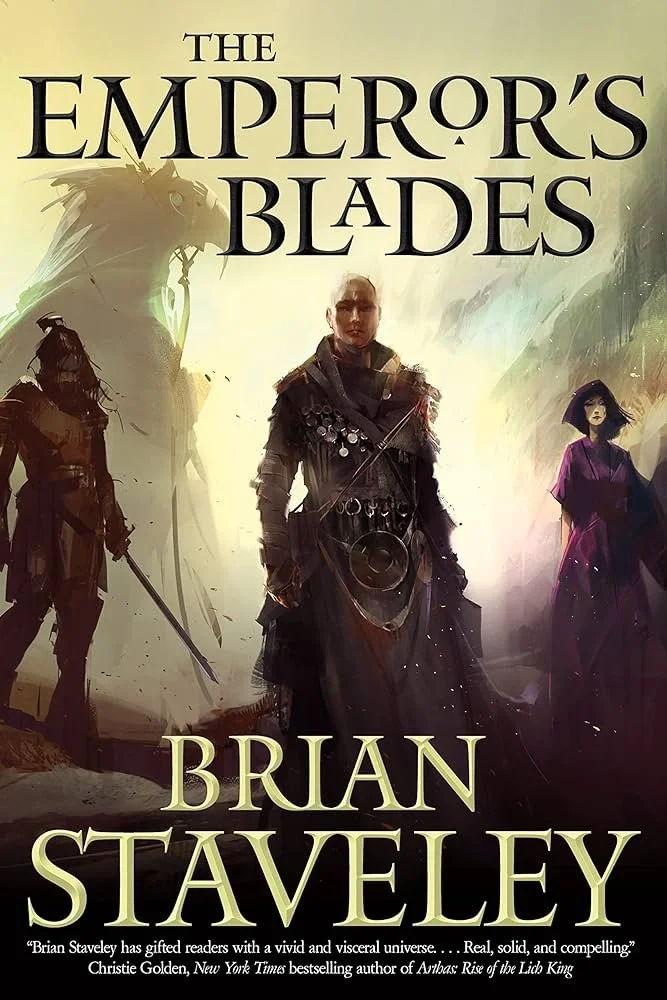Book Review: The Emperor's Blades
/Tor, 2014
It'll be a lucky thing indeed if 2014 fields a more promising fantasy-fiction debut than The Emperor's Blades, the first book in debut author Brian Staveley's "Chronicle of the Unhewn Throne," new from Tor. There's florid overwriting here, true, of the type that the industry seems unable to do without, but there's also vivid, evocative prose, some intriguing world-building, and an immediately involving cast of main characters. The old drugstore DAW sci-fi paperback fan in me may be piously horrified at the idea of paying $30 for one hardcover fantasy title when not so long ago that same amount could have bought a month's worth of promising debuts, but this one might actually be worth its extortionate price tag.
The heart of the story is the vast Annurian Empire, whose emperor has just been assassinated, catching his three children off guard and in the midst of their various preparations for adulthood. Adare, barred from the Unhewn Throne because of her gender, is a ranking minister in the empire's capital city, deep in the workings of its government - and uncomfortably aware of the shadowy forces working to bring about a change of dynasties. Second son Valyn is a hemisphere away training to join the elite ranks of the Kettral, ruthless soldiers who ride giant hawks into battle. And brash young Kaden, the actual heir to the throne, is dealing with miserable duties and tyrannical mentors in a remote mountain monastery, slowly approaching the knowledge of an ancient magic system that will obviously play a key role as the story unfolds. When their father dies, the three siblings must suddenly scramble to keep their hold on the empire.
Which would be interesting enough on its own, but Staveley has cleared absorbed (even if only by osmosis) the crucial combo-rule of today's multi-volume fantasy franchises: a threat within, and a threat without. The Annurian machinations in this first book are expertly done, but in the book's threat-from-without, the lurking Csestriim, Staveley has come up with a prime bunch of complex bad guys. Immortal and inhuman, the Csestriim are thought long extinct — but fantasy readers will know better. And the Csestriim are experiencing their own threat-from-within: a disease that's rotting their children, blighting them with doubt and decrepitude — things their pitiless parents can't abide, as is made wonderfully, chillingly clear in the book's opening scene:
At the sight of the blade, Faith made a strangled sound deep in her throat and flinched away. Tan'is wondered if she would try to run. A few did. They never made it far. This daughter of his, however, did not run. Instead, she balled her hands into white, trembling fists, and then, with an obvious effort of will, straightened from her knees. Standing, she was able to look him directly in the eye, and though tears plastered her hair to her cheeks, she no longer wept. For once, however briefly, the disfiguring terror had left her. She looked almost whole, hale."And you cannot love us for what we are?" she asked, words slow, steady for the first time. "Even polluted, even broken? Even rotten, you cannot love us?""Love," Tan'is repeated, tasting the strange syllable, revolving it on his tongue as he drove his knife in and up, past the muscle, past the ribs, into her galloping heart, "like hate - it is your word, daughter, not ours."
Even in the cold mountains of Kaden's monastery, the signs continue to increase that the Csestriim aren't extinct after all, that they may be returning to the world they once owned. The monastery's livestock have been preyed upon and horribly mutilated by some unknown creature, and when somebody finally glimpses it, the details are alarming:
"It's the size of a large dog."The size was the least of it. The creature looked like something out of the depths of nightmare, with legs like blades or shears, savage hacking members designed by some cruel god to cut and to crush. Worse, dozens of eyes, glassy orbs the color of spilled blood, protruded from it everywhere, even from the limbs, as though they had been grafted on by some unholy kenning. Kaden had studied a thousand species during his time at Ashk'lan, creatures as strange as the albino stream crab and the flame moth, plants he couldn't have dreamed up in a year of dreaming. They had been bizarre, but not unnatural. If [this] painting was anything to go by, there was something wrong about this creature. Something twisted.
The convergence of the siblings' three realms - politics, warfare, and the unknown - cause The Emperor's Blades to gain considerable speed and compulsion as it barrels along ... just in time to stop and make readers wait for the next volume. Time to start saving up that next $30.

